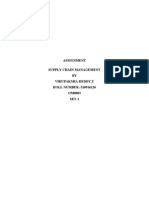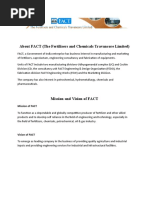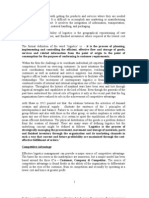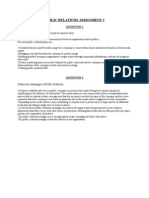Logistics Management Assignment 1
Uploaded by
Amar ChotaiLogistics Management Assignment 1
Uploaded by
Amar ChotaiLOGISTICS MANAGEMENT ASSIGNMENT 1
QUESTION 1
Identify and explain the activities of logistics:
-Customer service: Customer service has been defined as "a customer-oriented philosophy which integrates and manages all elements of the customer interlace within a predetermined optimum cost-service mix. Customer service is the output of the logistics system. It involves getting the right product to the right customer at the right place, in the right condition and at the right time, at the lowest total cost possible, Good customer service supports customer satisfaction, which is the output of the entire marketing process. -Demand forecasting/planning: There are many types of demand forecasts. Marketing forecasts customer demand based on promotions, pricing, competition, and so on. Manufacturing forecasts production requirements based on marketing's sales demand forecasts and current inventory levels. Logistics usually becomes involved in forecasting in terms of ho\v much should be ordered from its suppliers (through purchasing), and how much of finished product should be transported or held in each market that the organization serves. In some organizations, logistics may even plan production. Thus, logistics needs to be linked to both marketing and manufacturing forecasting and planning. -Inventory management: Inventory management involves trading off the level of inventory held to achieve high customer service levels with the cost of holding inventory, including capital tied up in inventory, variable storage costs, and obsolescence. These costs can range from 14 to over 50 percent of the value of inventory on an annual basis! With high costs for items such as high-tech merchandise, automobiles, and seasonal items that rapidly be come/obsolete, many organizations, including Hewlett Packard. Xerox, and Sears, are giving inventory management much more attention. -Logistics communications: Communications are becoming increasingly automated, complex, and rapid. Logistics interfaces with a wide array of functions and organizations in its communication processes. Communication must occur between: 1. The organization and its suppliers and customers. 2. The major functions within the organization, such as logistics, engineering, accounting, marketing, and production. 3. The various logistics activities listed previously. 4. The various aspects of each logistics activity, such as coordinating warehousing of material, work in process, and finished goods. 5. Various members of the supply chain, such as intermediaries and secondary customers or suppliers who may not be directly linked to the firm. Communication is key to the efficient functioning of any system, whether it be the distribution system of an organization or the wider supply chain.
-Material handling: Materials handling is a broad area that encompasses virtually all aspects of all movements of raw materials, work in process, or finished goods within a plant or warehouse. Because an organization incurs costs without adding value each time an item moves or is handled, a primary objective of materials management is to eliminate handling wherever possible. That includes minimizing travel distance, bottlenecks, inventory levels, and loss due to waste, mishandling, pilferage, and damage. Thus, by carefully analyzing material flows, materials management can save the organization significant amounts of money. -Order processing: Order processing entails the systems that an organization has for getting orders from customers, checking on the status of orders and communicating to customers about them, and actually filling the order and making it available lo the customer. Part of the order processing includes checking inventory status, customer credit, invoicing, and accounts receivable. Thus, order processing is a broad, highly automated area. Because the order processing cycle is a key area of customer interface with the organization, it can have a big impact on a customer's perception of service and. therefore, satisfaction. -Packaging: Packaging is valuable both as a form of advertising/marketing, and for protection and storage from a logistical perspective. Packaging can convey important information to inform the consumer. Aesthetically pleasing packaging also can attract the consumer's attention. Logistically, packaging provides protection during storage and transport. This is especially important for long distances over multiple transportation modes such as international shipping. Packaging can ease movement and storage by being properly designed for the warehouse configuration and materials handling equipment. -Parts and service support: In addition to supporting production through the movement of materials, work in process and finished goods, logistics also is responsible for providing after-sale service support. This may include delivery of repair parts to dealers, stocking adequate spares, picking up defective or malfunctioning products from customers, and responding quickly to demands for repairs. -Traffic and transportation: A key logistics activity is to actually provide for the movement of materials and goods from point of origin to point of consumption, and perhaps to its ultimate point of disposal as well. Transportation involves selection of the mode (e.g., air, rail, water, truck, or pipeline), the routing of the shipment, assuring of compliance with regulations in the region of the country where shipment is occurring, and selection of the carrier. It is frequently the largest single cost among logistics activities.
You might also like
- Instant ebooks textbook The Digital Supply Chain Bart L. Maccarthy download all chapters100% (3)Instant ebooks textbook The Digital Supply Chain Bart L. Maccarthy download all chapters51 pages
- Logistic and Supply Chain Managment Assessment - NG-OTHM-DLSCM-05-14No ratings yetLogistic and Supply Chain Managment Assessment - NG-OTHM-DLSCM-05-1452 pages
- 01-03-2021 Loi For The Supply of S-30 SugarNo ratings yet01-03-2021 Loi For The Supply of S-30 Sugar2 pages
- Case 1: Purchase Decision (Mr. J M Shah)No ratings yetCase 1: Purchase Decision (Mr. J M Shah)8 pages
- Exam Collaborate Session For Exam Revision New-10% (1)Exam Collaborate Session For Exam Revision New-128 pages
- Cost Accounting Theories Test Bank 2019 PDFNo ratings yetCost Accounting Theories Test Bank 2019 PDF43 pages
- Assignment Supply Chain Management BY Virupaksha Reddy.T ROLL NUMBER: 510916226 OM0003 SET-1No ratings yetAssignment Supply Chain Management BY Virupaksha Reddy.T ROLL NUMBER: 510916226 OM0003 SET-112 pages
- 2010 Third-Party Logistics Study Fast-Moving Consumer Goods Industry PDFNo ratings yet2010 Third-Party Logistics Study Fast-Moving Consumer Goods Industry PDF12 pages
- Case Study On Transportation in LogisticsNo ratings yetCase Study On Transportation in Logistics1 page
- The Logistics Industry and Its Role in Indian FMCGNo ratings yetThe Logistics Industry and Its Role in Indian FMCG19 pages
- About FACT (The Fertilisers and Chemicals Travancore Limited)No ratings yetAbout FACT (The Fertilisers and Chemicals Travancore Limited)12 pages
- Abhi - Introduction Scope and Historical Background of SCM100% (1)Abhi - Introduction Scope and Historical Background of SCM22 pages
- A Project On The Supply Chain Management of Newspapers and MagazinesNo ratings yetA Project On The Supply Chain Management of Newspapers and Magazines39 pages
- Chapter 6 - International Logistics, Risks InsuranceNo ratings yetChapter 6 - International Logistics, Risks Insurance41 pages
- What Are Some Recent Trends in Supply Chain ManagementNo ratings yetWhat Are Some Recent Trends in Supply Chain Management2 pages
- Production and Operations Management 3rd Edition R. Panneerselvam 2024 Scribd Download100% (4)Production and Operations Management 3rd Edition R. Panneerselvam 2024 Scribd Download61 pages
- Retail Management: Submitted To, Submitted ByNo ratings yetRetail Management: Submitted To, Submitted By18 pages
- Introduction To Retail Management Module 1100% (1)Introduction To Retail Management Module 152 pages
- Direct, Catalog, Telemarketing, E-Marketing, M-Commerce ND Personal SellingNo ratings yetDirect, Catalog, Telemarketing, E-Marketing, M-Commerce ND Personal Selling6 pages
- Assignment International Business MIB603 0519No ratings yetAssignment International Business MIB603 051912 pages
- Logistics Integration For Customer Satisfaction Distribution Cost Control and Customer ServiceNo ratings yetLogistics Integration For Customer Satisfaction Distribution Cost Control and Customer Service50 pages
- Transshipme NT Method: Prepared By: Justine Louisse R. AgpalasinNo ratings yetTransshipme NT Method: Prepared By: Justine Louisse R. Agpalasin27 pages
- Immediate download Looking at Logistics A Practical Introduction to Logistics and Supply Chain Management 3rd Edition Philip Price ebooks 2024100% (8)Immediate download Looking at Logistics A Practical Introduction to Logistics and Supply Chain Management 3rd Edition Philip Price ebooks 202467 pages
- Amar Chotai. REG NO: BUS-1-647-1/2014 Subject-Theo 111 Lecturer - MR Ringera. Purpose - Theo C.A.TNo ratings yetAmar Chotai. REG NO: BUS-1-647-1/2014 Subject-Theo 111 Lecturer - MR Ringera. Purpose - Theo C.A.T5 pages
- Assignment28227 - Business Finance 1i Ass 4No ratings yetAssignment28227 - Business Finance 1i Ass 42 pages
- Financial Accounting and Analysis Assignment 2No ratings yetFinancial Accounting and Analysis Assignment 25 pages
- Increase in CM (40 Units X $200) 8,000 $ Increase in Advertising Expenses 10,000 Decrease in Net Operating Income (2,000) $No ratings yetIncrease in CM (40 Units X $200) 8,000 $ Increase in Advertising Expenses 10,000 Decrease in Net Operating Income (2,000) $3 pages
- Chapter Nine: Decision Making With Relevant Costs and A Strategic EmphasisNo ratings yetChapter Nine: Decision Making With Relevant Costs and A Strategic Emphasis36 pages
- Tax Invoice/Bill of Supply/Cash Memo: (Original For Recipient)No ratings yetTax Invoice/Bill of Supply/Cash Memo: (Original For Recipient)1 page
- Key Account Management: Marketing and Sales Excellence100% (3)Key Account Management: Marketing and Sales Excellence35 pages










































































































